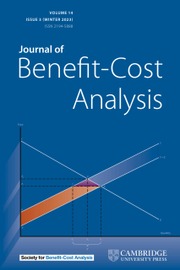Article contents
Benefit-Cost Analysis: Distributional Considerations under Producer Quota Buyouts
Published online by Cambridge University Press: 19 January 2015
Abstract
Benefit-cost (B/C) analysis must take into account the distributional effects from a policy or program change. To highlight this, we focus on the theory of production quota buyouts within a B/C framework. As an empirical application, we provide evidence on the distributional effects of the U.S. government buyout of the peanut program in 2002, where production quotas were key ingredients. Two approaches to producer compensation under the buyout are discussed: (1) value of quota approach and (2) gains from quota approach. In the peanut quota program buyout, the U.S. government chose the value of quota approach. Both consumers and producers were made better off as a result of the buyout, and there was a net gain in efficiency. If the government had chosen the gains from quota approach instead, government expenditures and producer gains would have been lower, and consumer benefits would have remained unchanged. Under either approach, the B/C ratios calculated for the government quota buyout are almost identical.
Keywords
Information
- Type
- Article
- Information
- Copyright
- Copyright © Society for Benefit-Cost Analysis 2011
References
- 10
- Cited by

